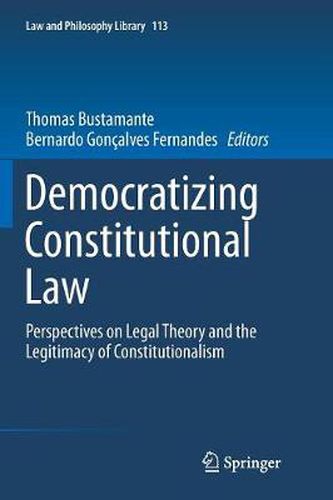Readings Newsletter
Become a Readings Member to make your shopping experience even easier.
Sign in or sign up for free!
You’re not far away from qualifying for FREE standard shipping within Australia
You’ve qualified for FREE standard shipping within Australia
The cart is loading…






This title is printed to order. This book may have been self-published. If so, we cannot guarantee the quality of the content. In the main most books will have gone through the editing process however some may not. We therefore suggest that you be aware of this before ordering this book. If in doubt check either the author or publisher’s details as we are unable to accept any returns unless they are faulty. Please contact us if you have any questions.
This volume critically discusses the relationship between democracy and constitutionalism. It does so with a view to respond to objections raised by legal and political philosophers who are sceptical of judicial review based on the assumption that judicial review is an undemocratic institution. The book builds on earlier literature on the moral justification of the authority of constitutional courts, and on the current attempts to develop a system on weak judicial review . Although different in their approach, the chapters all focus on devising institutions, procedures and, in a more abstract way, normative conceptions to democratize constitutional law. These democratizing strategies may vary from a radical objection to the institution of judicial review, to a more modest proposal to justify the authority of constitutional courts in their deliberative performance or to create constitutional juries that may be more aware of a community’s constitutional morality than constitutional courts are. The book connects abstract theoretical discussions about the moral justification of constitutionalism with concrete problems, such as the relation between constitutional adjudication and deliberative democracy, the legitimacy of judicial review in international institutions, the need to create new institutions to democratize constitutionalism, the connections between philosophical conceptions and constitutional practices, the judicial review of constitutional amendments, and the criticism on strong judicial review.
$9.00 standard shipping within Australia
FREE standard shipping within Australia for orders over $100.00
Express & International shipping calculated at checkout
This title is printed to order. This book may have been self-published. If so, we cannot guarantee the quality of the content. In the main most books will have gone through the editing process however some may not. We therefore suggest that you be aware of this before ordering this book. If in doubt check either the author or publisher’s details as we are unable to accept any returns unless they are faulty. Please contact us if you have any questions.
This volume critically discusses the relationship between democracy and constitutionalism. It does so with a view to respond to objections raised by legal and political philosophers who are sceptical of judicial review based on the assumption that judicial review is an undemocratic institution. The book builds on earlier literature on the moral justification of the authority of constitutional courts, and on the current attempts to develop a system on weak judicial review . Although different in their approach, the chapters all focus on devising institutions, procedures and, in a more abstract way, normative conceptions to democratize constitutional law. These democratizing strategies may vary from a radical objection to the institution of judicial review, to a more modest proposal to justify the authority of constitutional courts in their deliberative performance or to create constitutional juries that may be more aware of a community’s constitutional morality than constitutional courts are. The book connects abstract theoretical discussions about the moral justification of constitutionalism with concrete problems, such as the relation between constitutional adjudication and deliberative democracy, the legitimacy of judicial review in international institutions, the need to create new institutions to democratize constitutionalism, the connections between philosophical conceptions and constitutional practices, the judicial review of constitutional amendments, and the criticism on strong judicial review.